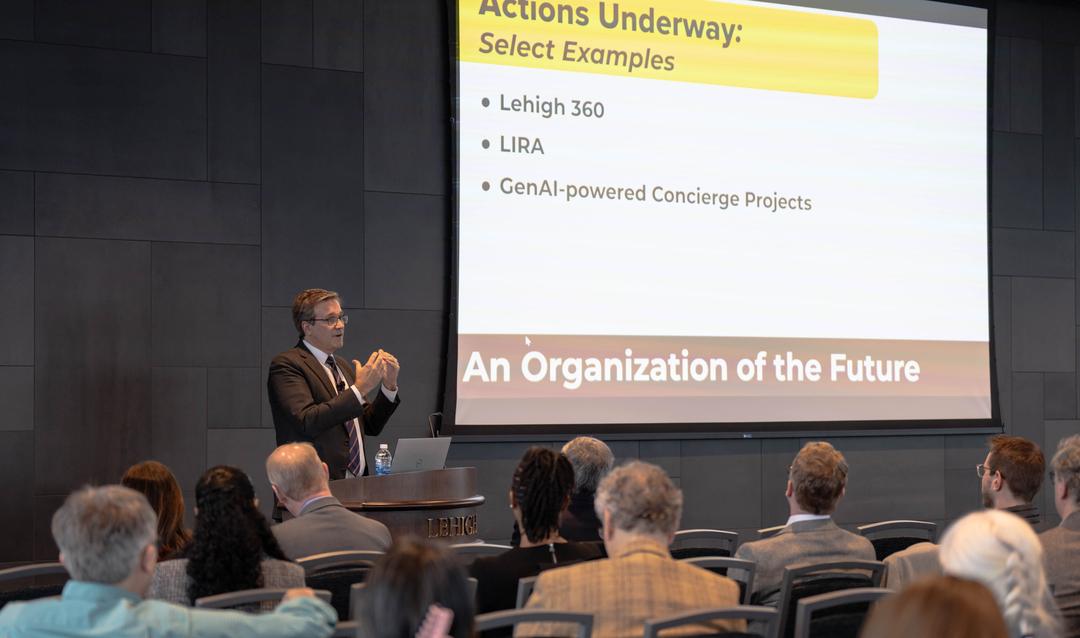University leadership provided significant updates on Lehigh’s strategic plan, Inspiring the Future Makers, on Wednesday, including ongoing efforts in research and educational innovation, the transformation of the Mountaintop campus, efforts to create a better student and faculty experience through technological advancements, and the development of university-wide principles governing free speech.
“I hope that if nothing else you walk away from our session today recognizing that there is a lot happening in the implementation phase,” said Lehigh President Joseph J. Helble '82, at the campus-wide gathering online and in person. “And there are many ways in which members of the community not only can, but must, get involved in helping us move toward our goals.”
During the presentation in the Wood Dining Room at Iacocca Hall on the Mountaintop campus, which was also broadcast via Zoom, Helble was joined by Chris Cook, vice president of strategic planning and initiatives; Greg Reihman, vice provost for Library and Technology Services; Provost Nathan Urban and Anand Jagota, vice provost of research.
Among the updates:
Research and Educational Innovation
- A proposal for “Catastrophe Modeling for Climate, Resilience, and Equity” was announced as the first University Research Center. Led by Paolo Bocchini, professor of structural engineering, the center seeks to identify and explore problems related to the way in which unusual events—hurricanes, pandemics and the like—can create catastrophes because of integrated and interlocking systems they can affect.
- A team continues to develop ideas for an “exploratory semester” option that would allow students to enroll at Lehigh without initially picking one of the undergraduate colleges. This would provide a structured way for students to learn about which college was best given their interests and career goals.
- Two new undergraduate living learning communities, with housing available in Warren Square for intercollege students and those interested in entrepreneurship, will open in Fall 2024.
- University leaders also are exploring the potential for a major renovation of Packard Lab “to put Lehigh at the forefront of engineering education,” Helble said.
Campus Planning and the Mountaintop Campus
- A team of consultants led by Beyer Blinder Belle is helping to develop a Lehigh campus plan that aligns facilities plans with the strategic plan. A key focus will be the Mountaintop Campus. University leaders will look to engage the campus community in the planning process starting in the spring.
- A demand study has been conducted for graduate housing, with more details expected later this semester, Helble said.
- Plans have been submitted to the City of Bethlehem for a one-week “test run” of a one-way loop on Sayre Park Road. Helble said he hopes Lehigh can make the Mountaintop campus and its surroundings, including the experimental forest and the wooded trails, more accessible to walkers, runners and bikers and improve connectivity with the Asa Packer Campus.
Organization of the Future
Work is being done to improve business processes and integrate technology into making it easier for the Lehigh community to navigate all the university offers.
Reihman pointed to Lehigh 360, a searchable database that uses machine learning and artificial intelligence to recommend high impact and interdisciplinary learning opportunities to students based on their interests and past experiences. He also talked about LIRA: Lehigh Integrated Research Administration, which is designed to make it simpler to prepare, submit, accept and manage grants. Lehigh’s home page also has been redesigned and updated to make it easier to navigate.






